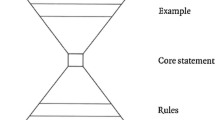Abstract
Plato claimed that morality exits to control conflict. Business people increasingly are called upon to resolve moral conflicts between various stakeholders who maintain opposing ethical positions or principles. Attempts to resolve these moral conflicts within business discussions may be exacerbated if disputants have different communicative styles. To better understand the communication process involved in attempts to resolve a moral dilemma, we investigate the "discourse ethics" procedure of Jürgen Habermas. Habermas claims that an individual's level of moral reasoning parallels the type of communication which that individual typically uses in attempts to resolve conflict. Our research focuses upon the relationship between the communicative style used by participants attempting to resolve a particular moral dilemma involving workplace safety and the level of moral reasoning possessed by those participants. The results of our study suggest that, contrary to Habermas' views, participants with "higher" levels of moral reasoning do not use "discursive" communicative tactics more frequently than participants that possessed "lower" moral reasoning.
Similar content being viewed by others
References
Baier, K.: 1965, The Moral Point of View: A RationalBasis of Ethics(Random House, New York).
Berkowitz, M. W. and J. C. Gibbs: 1983, 'Measuring the Developmental Features of Moral Discussion', Merrill-Palmer Quarterly 29, 399-410.
Blasi, A.: 1979, 'Bridging Moral Cognition and Moral Action: A Review of the Literature and a Functional-Developmental Model', Unpublished Manuscript (University of Massachusetts at Boston).
Brown, M.: 1994, The Ethical Process(Basic Resources, Berkeley).
Falk, W. D.: 1953, 'Goading and Guiding', MindLXII.
Fisher, R. and W. Ury: 1981, Getting to Yes(Penguin, New York).
Frankena, W. K.: 1963, Ethics(Prentice Hall, Englewood Cliffs, NJ).
Gibbs, J. C., S. U. Schnell, M. W. Berkowitz and D. S. Goldstein: 1984, Relations Between FormalOperational Reasoning and Logical Modes of SocialConflict ResolutionUnpublished Manuscript (Ohio State University, Columbus, OH).
Habermas, J.: 1976, Communication and the Evolutionof Society(Beacon Press, Boston, MA).
Habermas, J.: 1990, Moral Consiousness and CommunicativeAction(MIT Press, Cambridge, MA).
Kohlberg, L.: 1969, 'Stages and Sequence: The Cognitive Developmental Approach to Socialization', in D. A. Goslin (ed.), Handbook ofSocialization Theory and Research(Rand McNally, Chicago).
Kohlberg, L.: 1980, The Measurement of Moral Judgment(Harvard University Center for Moral Education, Cambridge, MA).
Kurtines, W. M.: 1989, 'The Communicative Functioning Scale: Moral Dilemmas', Unpublished Manuscript (Florida International University Department of Psychology, Miami).
Kurtines, W. M. and S. R. Pollard: 1989, 'The Communicative Competence Scale - Critical Discussion Manual', Unpublished Manuscript (Florida International University Department of Psychology, Miami).
McDougall, W.: 1908, Social Psychology(John W. Luce, Boston).
Mead, G. H.: 1934, 'Fragments on Ethics', in C. K. Morris (ed.), Mind, Self and Society from theStandpoint of a Social Behaviorist(University of Chicago Press, Chicago), pp. 379-389.
Perry, R. B.: 1954, Realms of Value: A Critique ofHuman Civilization(Harvard University Press, Cambridge, MA).
Piaget, J.: 1932, The Moral Judgment of the Child(The Free Press, New York).
Rahim, M. A., J. E. Garrett and G. F. Buntzman: 1992, 'Ethics of Managing Interpersonal Conflict in Organizations', Journal of Business Ethics 11, 423-432.
Rehg, W.: 1994, Insight and Solidarity: A Study in theDiscourse of Jürgen Habermas(University of California Press, Berkeley).
Rest, J. R.: 1979a, Developments in Judging Moral Issues(University of Minnesota Press, Minneapolis).
Rest, J. R.: 1979b, Manual for the Defining Issues Testof Moral Judgment(Center for the Study of Ethical Development: University of Minnesota Press, Minneapolis).
Rest, J. R., M. Bebeau and J. Volker: 1986, 'An Overview of the Psychology of Morality', in J. R. Rest (ed.), Moral Development: Advances in Researchand Theory(Preager Publishers, New York).
Rossouw, G. J.: 1994, 'Rational Interaction for Moral Sensitivity: A Postmodern Approach to Moral Decision-making in Business', Journal of BusinessEthics 13, 11-20.
Thoma, S.: 1986, 'On Improving the Relationship Between Moral Reasoning and External Criteria: The Utilizer/Nonutilizer Dimension', Doctoral Dissertation (University of Minnesota, Minneapolis).
Thomas, K.: 1976, 'Conflict and Conflict Management', in M. D. Dunnette (ed.), Handbookof Industrial and Organizational Psychology (Rand McNally College Publishing Co., Chicago).
Toulmin, S. E.: 1956, An Examination of the Place ofReason in Ethics(Cambridge University Press, Cambridge).
Toulmin, S. E.: 1964, The Use of Argument(Cambridge University Press, Cambridge).
Trevino, L. K.: 1992, 'Moral Reasoning and Business Ethics: Implications for Research, Education and Management', Journal of Business Ethics 11, 445-460.
Rights and permissions
About this article
Cite this article
French, W., Allbright, D. Resolving a Moral Conflict Through Discourse. Journal of Business Ethics 17, 177–194 (1998). https://doi.org/10.1023/A:1005792208264
Issue Date:
DOI: https://doi.org/10.1023/A:1005792208264




